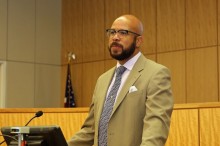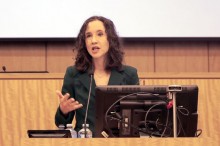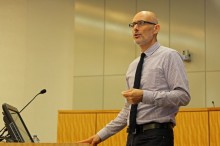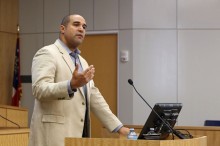2016 Atlanta
Ninth Annual CTAUN Conference in Atlanta
WELCOMING NEW AMERICANS:
IMMIGRANTS AND REFUGEES STRENGTHEN OUR COMMUNITY
Saturday 22 October 2016
8:00 a.m. – 5:00 p.m.
Georgia State University School of Law
Keynote Address:
Jana Mason, J.D., Senor Advisor for External Relations and Government Affairs at the Washington, D.C. office of the United Nations High Commissioner for Refugees (UNHCR)
CONFERENCE REPORT
This year CTAUN partnered with Georgia State University’s Alonzo A. Crim Center for Urban Educational Excellence. 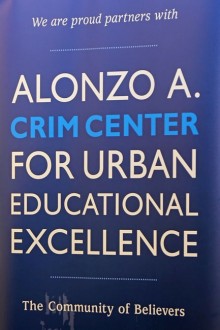
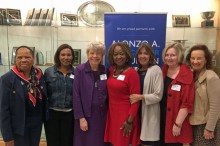
Atlanta Steering Committee: Mina Veazie, Georgia State University
Haimanot Haile, Georgia State University
Anne-Marie Carlson, Chair, CTAUN
Gwen Benson, Associate Dean, College of Education, Georgia State University
Eileen Venezia, CTAUN Atlanta Coordinator
Susan Ogletree, Director of Research, College of Education, Georgia State University
Emilie Stris, CTAUN Atlanta Coordinator
Not in photo: James Badger, University of North Georgia
The conference was organized by Mina Veazie, M.Ed. – CREST ED. Project Coordinator, College of Education and Human Development, Georgia State University; and Haimanot Haile, CREST ED. Student Assistant, with the assistance of the CTAUN steering committee.
The CTAUN sessions at the conference focused on new Americans in the greater Atlantic area by looking at the backgrounds, issues facing immigrants, their accomplishments and the many ways in which they are contributing to our Communities.
Conference Welcomes were extended by:
Brian Anthony Williams, Ph.D, Director Alonzo A. Crim Center for Urban Educational Excellence
Gwen Benson, Ph.D, Associate Dean, School, Community, and International Partnerships, College of Education and Human Development, Georgia State University
Anne-Marie Carlson, CTAUN Chair who introduced the keynote speaker, Jana Mason, M.A., J.D. Ms. Mason is Senior Advisor for External Relations and Government Affairs at the Washington, D.C. office of United States High Commissioner for Refugees (UNHCR).
Keynote Speaker
Jana Mason stated that in her 30 years involved with this topic she has not seen the level of public interest so high and so misinformed.
Sadly much of the discourse via the media – public radio & T.V – is negative and misleading.
Her presentation started with a 4 minute video which gave a basic sense of the problem visually. She then framed the problems for immigrants on a global level and continued down to the local level.
The number of forcibly displaced people worldwide has reached over 65 million, the highest on record since World War II. The UN Refugee Agency (UNHCR) estimates that there are today 4.8 million Syrian, 2.7 million Afghanistan, 940,000 South Sudan, 900,000 Somalia and 630,000 Sudan classified as refugees.
MORNING PANEL ONE – Policy and Action: Immigrants and Refugees.
Moderator: Aaron Lichkay, Graduate Student, Andrew Young School of Public Policy, Georgia State University
Panelists: Jonathan Todres J.D., Professor of Law, Center for Law Health and Society, Georgia State University College of Law; Sara Rich
J.D., Staff Attorney, Southern Poverty Law Center’s Immigrant Justice Project; Azadeh N. Shahshahani J.D., Legal Advocacy Director with Project South; Dawson Verley, MIT Inspire Scholar, Forced Displacement and Education Research (Live Stream); Ryan Maltese M.A., J.D. Professor of Political Science, Freedom University.
The panelists discussed the challenges that current immigrants face and ways to ensure fair and equitable treatment for them.
Professor Todres’ specialty is Children’s Rights law. He stated that issues affecting children shall be governed by the best interest of the child. He talked about teaching children about their rights and their duties to respect the rights of others. He encouraged using children’s literature to do this. Some books he recommended are: Peter Rabbit, Horton Hears a Who, and Ferdinand.
Sara Rich discussed the Southern Poverty Law Center’s Immigrant Justice Project. Some activities include: teaching tolerance, monitoring hate groups, and suing hate groups. She mentioned the project’s magazine, Teaching Tolerance which provides updates on issues ranging from race, ethnicity and gender equality to?.
Azadeh N. Shahshahani discussed Project South. She explained several of the project’s focus areas:
1) Raising awareness of the rights of Muslim refugee, and immigrant communities.
2) Providing training for attorneys to enable them to represent these communities
3) Documenting conditions at detention centers incarcerating immigrants.
Ryan Maltese shared research on undocumented students. i.e. Georgia doesn’t allow undocumented students into public colleges.
DREAM ACT (Development, Relief, and Education for Alien Minors) would provide a pathway to legal status for thousands of undocumented students who graduated from high school. The Dream Act first introduced in 2001 has not passed by Congress.
LUNCH
Participants had time to chat with Karen Shebuski and Jaleh Davari, first year Doctoral students in the Counseling Psychology program at Georgia State University. Both women are certified Youth Mental Health First Aid Instructors. Their research team is concentrating on the interaction between mental health, youth, and the refugee community.
AFTERNOON PANEL TWO – Education and Action: Immigrants and Refugees.
Moderator: James Badger, D. Phil, Professor, College of Education, Director, Center for Language Education, University of North Georgia.
Panelists:
Roberta Malevenda, Clarkston Development Foundation (CDF) Action, Bilingual and Early Education; Ruhi Rahman, Atlanta U.S. Fund for UNICEF, Children in Global Refugee Crisis; Carrie Mc Garity Woodcock, Head of World Language Academy/Global Initiatives, Hall County Schools, Georgia; William J. Nichols, Ph.D, Co-director, Center for Urban Language and Teaching Research, Georgia State University; Kitti Murray, Refuge Coffee Company, Clarkston; Barbara Thompson, Executive Director, Solutions for Interrupted Education.
It has been reported that immigrant parents expressed that their most intense frustration is limited access to quality education. The panelists addressed the issues of language and cultural barriers, as well as developing partnerships with the community.
Roberta Malevenda presented two programs being used in a multi-lingual community in Clarkston, Georgia. The READY School model, located in apartment complexes, is a free program serving 3 year old children. It was started by parents in partnership with the community.
The Enhanced Child Development Association (CDA) program with Georgia Piedmont Technical College includes programs for the Somali community members to become teachers.
Ruhi Rahman is the Community Engagement Fellow at the U.S. Fund for UNICEF. Ms. Rahman talked about the large numbers of children who are displaced. Through UNICEF’s Global Citizenship Fellows Program her role is to bring global issues into classrooms, to show how we are all interconnected, and how to take action.
UNICEF is committed to creating a world in which all children regardless of their gender, socio-economic background or circumstances, have access to free compulsory and quality education. UNICEF supports Education for ALL (EFA) and Education Cannot Wait. More information can be obtained on their website. unicef.org
Carrie Mc Garity Woodcock heads the World Language Academy in Hall County, Georgia. She described how the academy was developed. At the Academy students learn multi-languages (??), and about their cultures. The community is involved by learning respect for themselves and ways to respect and help others. Students are engaged in activities to raise funds. i.e. they raised money to send some 8th grade students to Costa Rica.
William J. Nichols discussed how the Center for Urban Language Teaching and Research at Georgia State University supports language teachers. The Center is a U.S. Department of Education Title VI Foreign Language Resource Center. Its role is to promote and improve the teaching and learning of foreign languages. An area of focus is advocacy on the side of teachers?. It also tries to get other groups to support their endeavors (the Center for Urban Language Teaching) such as, K-16 education, business, non-profit groups and governments.
Kitti Murray, talked about her non-profit business, Refuge Coffee Co. The business is 1 ½ years old. Its operation is a truck where coffee is ordered and then taken indoors to drink it. Kitti’s mission is to create a safe place in a diverse environment. Refugee and immigrant trainees run the business. NGOs in Clarkston train them to develop skills necessary to run a business.
Barbara Thompson, dealt with the question, “How do you get rich kids education to poor kids.” Ms. Thompson’s projects include private schools. She mentioned the International Community School, the Saturday School and the Global Village Project. The Global Village Project is a tuition-free private middle school for refugee teenage girls with interrupted education.
Afternoon Panel Three: Health, Outreach and Action: Immigrants and Refugees.
Moderator: Ryan Maltese, Georgia State University
Hasan Crockett, Ph.D., Educational Specialist, Covenant House Georgia, Homeless Youth (?), Regina Jennings, Director of Support Services, Covenant House Georgia, Homeless Youth; Omar Shekhey, President and Executive Director, Somali American Community Center; Bill Johnson, Senior Pastor, Reach the Nations Community Church, Stone Mountain; Kuldip Singh, Sikh American Community.
The panelists discussed health and mental health issues that refugees and immigrants face and places where they can obtain assistance.
Closing Speaker: Mosi Makori, Co-Founder, Star Institute for Conscious Organization
With the sessions organized by Georgia State University’s Alonzo A. Crim Center for Urban Educational Excellence addressing the theme Breaking (the Neutral) Ground: Collaboration, Negotiation and Celebration in Urban Education, the closing session focused on different organizations and individuals coming together to discuss difficult issues impacting urban education.
Here it drew upon the history of New Orleans with its wide grassy sections in the middle of major avenues. There these spaces became “neutral grounds” or “medians” for discussions of controversial issues.
Discussion followed led by Mosi Makori sharing some of the conditions that the schools of New Orleans are facing while conference registrants elaborated on current issues in Georgia.
End of Day Get-Together: The day’s events ended with a Happy Hour featuring Saxophonist Ryan Kilgore on the 6th Floor Terrace of this new Georgia State University College of Law building in downtown Atlanta, the site of our conference.

